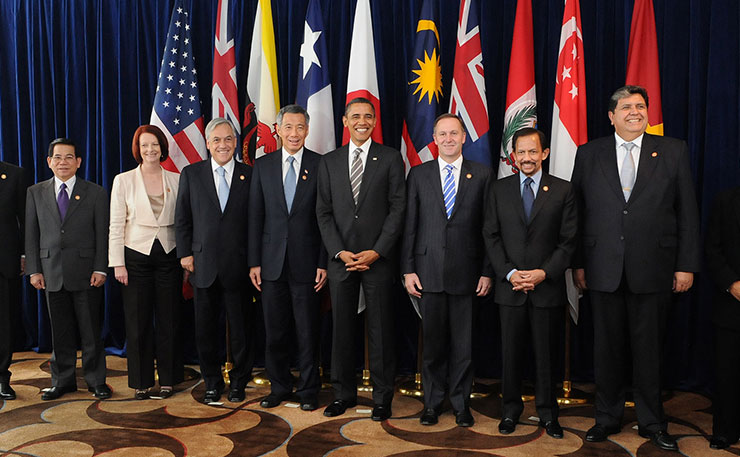Environmental groups have condemned the looming Trans-Pacific Partnership trade deal after news broke overnight that 12 ‘Pacific rim’ countries, including Australia, have successfully concluded the final round of a five year negotiation.
Their concerns centre on what are known as Investor-State Dispute Settlement (ISDS) provisions, which allow foreign corporations to sue governments in tribunals that sit outside the nation’s legal system.
“The Trans-Pacific Partnership would empower big polluters to challenge climate and environmental safeguards in private trade courts and would expand trade in dangerous fossil fuels that would increase fracking and imperil our climate,” said Michael Brune, the Executive Director of America’s Sierra Club.
It’s a concern that governments have been keen to head off, with President Barack Obama issuing a statement claiming the TPP “includes the strongest commitments on labor and the environment of any trade agreement in history”.
According to Obama, “those commitments are enforceable, unlike in past agreements”.
But Greenpeace research specialist Charlie Cray said such assurances are “a cynical, last-minute sop intended to divide the environmental community [which don’t]change the fact that the TPP will likely to more harm than good”.
“There is no way green-looking window-dressing can make up for a secretly negotiated trade agreement that, by design, empowers multinationals to undermine environmental standards,” Cray said.
Civil society and trade unions have been entirely locked out of the talks, but over recent years and months Wikileaks has managed to obtain and publish draft chapters which have caused extreme alarm among interested parties not privy to the detail of how exactly the agreement will ‘liberalise’ markets.
Responding to a leaked draft of the environment chapter dated November 2013 Jane Kelsey, a Professor of Environmental Law at the University of Auckland, wrote last year that “most of the provisions are aspirational and [the TPP]have no teeth to enforce what limited obligations there are”.
The full text of the agreement is not yet available, but its ramifications will be massive if it is eventually ratified, and could see companies’ rights to ‘expected profits’ triumph over legitimate public interest legislation designed to protect the environment.
The Trans-Pacific Partnership is the largest free trade deal in a generation, encompassing countries responsible for 40 per cent of the world’s gross domestic product. It is widely seen as an effort to head off China’s growing economic might in the Asia Pacific.
Since negotiations kicked off in Melbourne in 2010, 12 countries have been involved in the talks. They include Australia, Brunei, Canada, Chile, Japan, Malaysia, Mexico, Peru, New Zealand, Singapore, the United States, and Vietnam.
Australia’s Trade Minister, Andrew Robb released a statement this morning touting the benefits the deal could bring. He said that last year “one third of Australia’s total goods and services exports – worth $109 billion – went to TPP countries”.
For its part, the Department of Foreign Affairs and Trade said the deal “will include the most extensive environment chapter Australia has negotiated as part of a free trade agreement”.
Mollifications of this sort are of course emanating from a dozen trade ministers around the world, but the Centre for International Environmental Law President, Carroll Muffett said believing the deal will not damage the environment would be “a triumph of hope over experience”.
“For two decades, the United States and its trading partners have failed to effectively implement the environmental provisions in existing trade agreements,” she said.
“From the North American Free Trade Agreement to the Peru Free Trade Agreement, the weakness hasn’t been poor wording but lack of political will.
“Assuming that the environmental provisions of TPP will somehow fare better, when they are shepherded by the same agencies, and vocally opposed by many parties to the agreement, is a triumph of hope over experience,” Muffett said.
The Chief Justice of the Australian High Court has also expressed concern, in a paper canvassing the issues that Investor-State Dispute Settlement mechanisms might throw up.
“So far as I am aware the judiciary, as the third branch of government in Australia, has not had any significant collective input into the formulation of ISDS clauses in relation to their possible effects upon the authority and finality of decisions of Australian domestic courts,” Chief Justice French wrote in July last year.
“This is an issue which presently is of small compass [but]It has the potential to become larger and it is desirable that it be addressed earlier rather than later.”
Among others possibilities, Chief Justice French mooted the insertion of requirements that remedies first be sought by multinationals in domestic courts, and specific rules to prevent free trade tribunals overruling the local judiciary.
The final text of the TPP agreement will be tabled in Parliament along with a National Interest Analysis in coming weeks or months, and will be reviewed by the Joint Standing Committee on Treaties.
Donate To New Matilda
New Matilda is a small, independent media outlet. We survive through reader contributions, and never losing a lawsuit. If you got something from this article, giving something back helps us to continue speaking truth to power. Every little bit counts.




